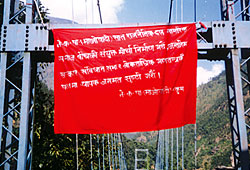 On the face of it, the 12-point accord between the opposition parties and the Maoists appears to be a breakthrough but analysts say there are still significant points where the two sides don't agree.
On the face of it, the 12-point accord between the opposition parties and the Maoists appears to be a breakthrough but analysts say there are still significant points where the two sides don't agree. The compromise by the parties was on the issue of constituent assembly in return for the Maoists agreeing to decommission arms under UN supervision in a run-up to it (Read 12-point Maoist MoU).
However, some experts say the constituent assembly election is a major sticking point between the parties and the rebels. Also the palace-army combine will never agree to it.
"It's a mirage, it's never going to happen," constitutional lawyer Ganesh Raj Sharma told us. "The conditions for the elections of a constituent assembly in the agreement are so vague that one can't see when it will ever materialise."
The government's first reaction to the party-rebel alliance was surprisingly muted. The king's trusted foreign minister, Ramesh Nath Pandey, told reporters at the airport on Wednesday on return from Tunis: "It doesn't mater who restores peace, as long as it is restored." His colleague, Information Minister Tanka Dhakal was less diplomatic but even he said that the government was \'studying\' the agreement.
Since both ministers were with the king before his African safari, they must reflect the monarch's mindset. In fact, there are indications the king was briefed about the impending agreement before he left last week.
It is the hardline royal right that is most outraged. The king's adviser and former commander-in-chief Satchit SJB Rana on Wednesday lashed out at the 12-point agreement, calling it \'unnatural\'. It is clear that the palace considers a constituent assembly election as synonymous with republic and a no-go. Furthermore, the main hurdle still remains because this is not yet an agreement between the two warring sides.
All eyes are now on the king and his scheduled return on 2 December, the same day the Maoist unilateral ceasefire is due to expire. Will he listen to his hardline advisers or respond to his increasing international isolation? Will the Maoists extend the ceasefire? Will the army reciprocate?
The reaction from the international community has been cautious optimism. The UN Secretary -General said Wednesday he was \'carefully studying the details\' of the agreement and he was \'ready to assist in any manner that would help bring about a peaceful resolution of the conflict\'.
The Americans and the Indians seem to be in close touch. But New Delhi, which has been the most vocal opponent of UN involvement, reacted guardedly: 'India believes that all outstanding issues ought to be resolved through the efforts of the people of Nepal themselves and that the role of the international community should be limited to support these efforts.'
Without a UN role, there will be no constituent assembly elections and the parties will boycott all polls under this regime. For Sharma, all this points to continued deadlock despite the 12-point agreement. "It means Nepalis will be deprived of their right to vote for an indefinite period and that in turn means power will continue to remain in the hands of the palace and our neighbours," he added.
The only point that makes some hopeful is that the agreement paves the way for the rebels to enter peaceful mainstream politics. Under pressure from political figures in India, the Maoists don't seem to have much of a choice.
And the Indian statement doesn't miss this point: 'It remains to be seen whether Maoists are genuinely prepared to live up to their commitments and refrain from acts of violence and extortion.'


